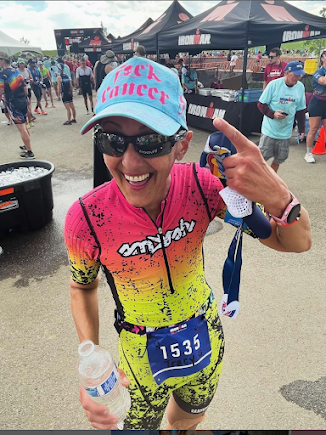It has been a few months since I checked in, and honestly, I've been trying to check out. The world is a scary, sad place right now, and my little experiences within it are seemingly less meaningful by the day. This has been one of the worst years of my life, and the struggles continue - surgery #7 in 5 years happening today, not cancer related, but still.
A quick recap:
Started 2025 feeling celebratory and grateful. Had many exciting things planned to celebrate turning 50.
January - went to MX for Widespread Panic. Little did I know this would be my only live music of 2025....
February - March - Celebrated 4 years cancer free in Saguaro National Park. Went to a training camp in Arizona, and had a bike wreck. Broke my jaw, 4 teeth, and my wrist. Bruised the hell out of my chest.
Surgery #1 to reduce and stabilize mandible. Jaw wired shut for 7 weeks. Ate liquid food through a silicone straw. Hardware put in to fix the wrist (surgery #2).
April - Cancelled our 50th Birthday Dive trip to the Maldives. We'd planned this for 2 years. 9 days on a liveaboard with our favorite dive instructor. Crushed.
May - wrist hardware ruptured my EPL tendon, and I can no longer extend or give a thumbs up with my right (dominant) hand. Emergent surgery to remove hardware.(#3 so far this year for those counting at home.)
June - cancelled Boulder 70.3 ironman - was supposed to be aiming for a world champ slot, instead spent my year one handed eating through a straw. Probably the worst shape I've been in since my 30's.
Aug - Decide to postpone getting my thumb fixed until AFTER our next adventure to raft the CO river in October. Turned 50. Lamest birthday ever. Feeling so Gen X right now.
Sept 1 - freak accident tripping over a four year old, and dislocated my shoulder. In my kitchen. And put it back in myself. It re-dislocated that night while I was asleep, and a few weeks later doing simple yoga. Also put it back in myself x2 more because, you know, ER docs don't really go to the ER. Apparently.
Sept 14 - after a precipitous decline and still unclear etiology, my father in law moves in with us on hospice and passes away one week later. There is turmoil amongst the family and now trying to support my poor husband through this.
Oct 2 - Instead of bucket list trip to CO river, which would have been heading out this morning, cancelled yet ANOTHER life long dream trip because rafting with an unstable shoulder would be dumb. And today I head back to the OR for surgery #4 this year to get my shoulder repaired/stabilized so it hopefully doesn't fall out again.
And in the midst of all this, Breast Cancer Awareness month comes charging in, making itself and it's pink awareness ever present in every news feed, social media, local press, and just fucking everywhere. It is exhausting. I've written in earlier posts about being thoughtful when donating to breast cancer related causes, and how important it is to vet charities and organizations selling pink stuff. If you want to support real meaningful research, I would suggest a donation to the Sikora lab at CU Anschutz, as they are studying HR+ breast cancer, ILC in particular, and they aren't trying to sell you anything (though you will get a cool tote bag if you donate, and it says you support lobular research, which your donation very much does).
https://www.sikoralab.com/donate
If you're in the area, we'll be hosting a global ILC awareness day at CU anschutz on 10/15, and we'll be advocating for resumption of funding for cancer research, learning about the latest in Sikora lab research, and I'll personally be trying to find a positive nugget of good news for breast cancer patients.
Cancer is exhausting - emotionally. Financially. Interpersonally and within a community. And it never ends. With my kind of cancer, I'm just "no evidence of disease" until at least 2041, not "cancer free". My stupid tumor biology has mastered the art of senescence and dormancy, and likes to pop up sometimes decades later. So I'm never free of cancer, in my mind, maybe in my body, and I can't really feel relief for another 15 or so years. I'm going to spend this October trying to reclaim my mind and body from breast cancer, instead of leaning all in to the awareness. Think before you Pink.













